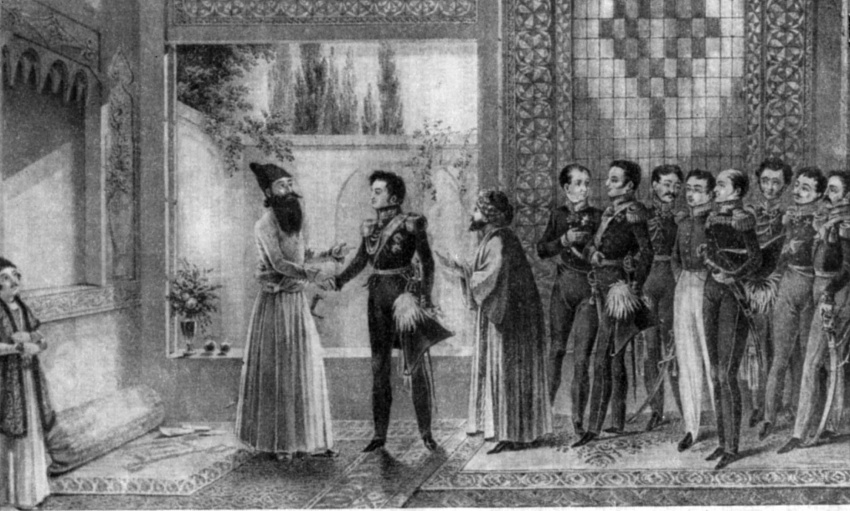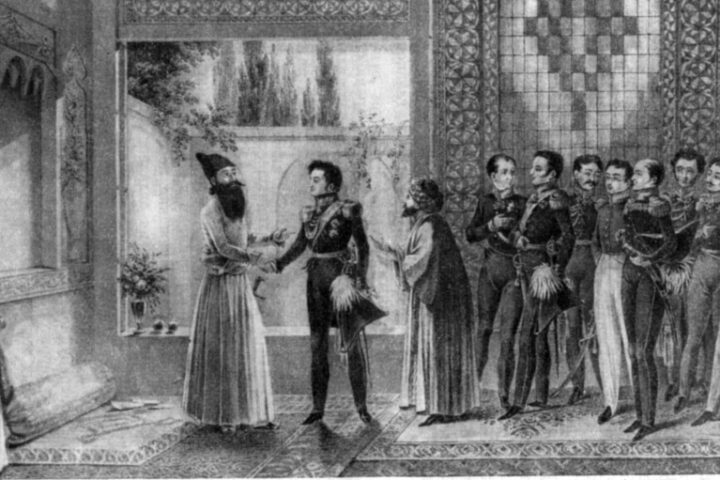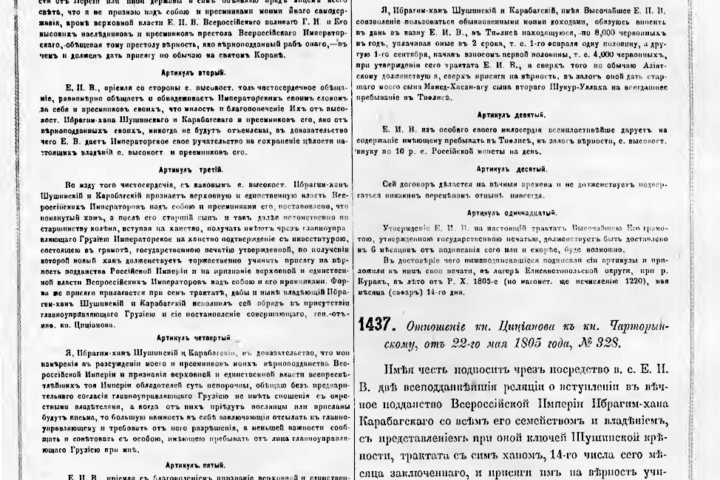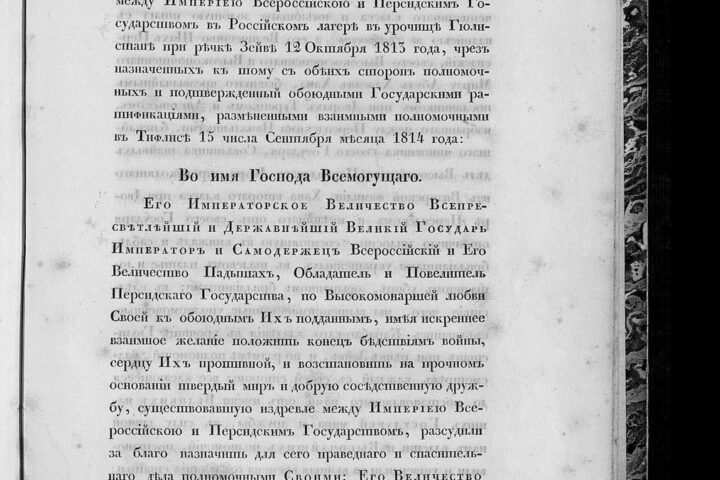The Kars treaty established the borders between Turkey and the three Transcaucasian republics of the Soviet Union, which are now the independent republics of Armenia, Georgia and Azerbaijan.
Translation of the treaty in English
Treaty of Friendship between Turkey, the Azerbaijan Socialist Soviet Republic, the Socialist Soviet Republic of Armenia and the Socialist Soviet Republic of Georgia on one hand and Turkey on the other, concluded with the participation of the Russian Socialist Federative Soviet Republic, in Kars on October 13th 1921.
The Government of the Grand National Assembly of Turkey, on the one side, and the Governments of the Socialist Soviet Republic of Armenia (SSRA), the Azerbaijan Socialist Soviet Republic (ASSR), and the Socialist Soviet Republic of Georgia (SSRG), on the other side, Agreeing on the principle of the fraternity of the nations and on the right of the peoples to dispose freely of their destiny; desirous to establish cordial affinity and sincerely amicable relations between them, based upon reciprocal interest; Have decided to enter into negotiations, with the participation of the Government of the Russian Socialist Federative Soviet Republic (RSFSR), to conclude a Treaty of Friendship and for this purpose have appointed as their plenipotentiaries
The Government of the Socialist Soviet Republic of Armenia: Askanaz Mravian, People’s Commissar for Foreign Affairs; Poghos Makintsian, People’s Commissar for Internal Affairs
The Government of the Socialist Soviet Republic of Azerbaijan: Behboud Shahtahtinskiy, People’s Commissar for State Control
The Government of the Socialist Soviet Republic of Georgia: Shalva Eliava, People’s Commissar for War and Navy; Alexander Svanidze, People’s Commissar for Foreign Affairs and People’s Commissar for Finance;
The Government of the Grand National Assembly of Turkey: Kiazim Kara Bekir Pasha, Deputy to the Grand National Assembly from Adrianople and Commander of the Eastern Front; Veli Bey, Deputy to the Grand National Assembly from Bordour; Mouhtar Bey, former Undersecretary of State for Public Works; Memdouh Shevket Bey, Turkish Plenipoteniary Representative in Azerbaijan;
The Government of the Russian Socialist Federative Soviet Republic: Jacques Hanetzky, Plenipotentiary Representative in Lithuania, who, having communicated their powers that have been found to be in due form, have agreed as follows:
Article 1
The Government of the Grand National Assembly of Turkey and the Governments of the Socialist Soviet Republics of Armenia, Azerbaijan, and Georgia consider as null and void the treaties concluded between the Governments which have previously exercised sovereign rights over territory actually forming part of the territory of the Contracting Parties and concerning the above-mentioned territories, as well as the treaties concluded with third states concerning the Transcaucaucasus Republics.
It is understood that the Turkish-Russian Treaty signed in Moscow on March 16, 1921 (1337) will be exempted from the terms of this Article.
Article 2
The Contracting Parties agree not to recognize any treaty of peace or other international act imposed upon one any of them against its will. In virtue of this agreement, the Governments of the Socialist Soviet Republics of Armenia, Azerbaijan and Georgia agree not to recognize any international act concerning Turkey which has not been recognized by the National Government of Turkey, actually represented by its Grand National Assembly.
(By the term Turkey is meant, in the present Treaty, the territories included in the Turkish National Pact of January 28, 1920 (1336), developed and proclaimed by the Ottoman Chamber of Deputies in Constantinople and communicated to the press and to all States).
For its part, the Government of the Grand National Assembly of Turkey agrees not to recognize any international act concerning Armenia, Azerbaijan, and Georgia that may not be by the respective Governments of these countries, actually represented by the Soviets of Armenia, Azerbaijan, and Georgia.
Article 3
The Governments of the Socialist Soviet Republics of Armenia, Azerbaijan and Georgia, recognizing that the system of capitulations is incompatible with the free life of the national development of all countries, as well as with the full exercise of sovereign rights, consider as null and abrogate the exercise, in Turkey, of all offices and rights included in this system.
Article 4
The northeast border of Turkey (according to the map of the Russian General Staff, on a scale of 1:210000.5 verstes to the inch) is determined by the line which, beginnin at the village of Sarp on the Black Sea, passes by the Mt. Khedis Mga, the watershed line of at Mt. Shavshet- Mount Kana Dagh; from there, it always follows the former northern administrative borders of the sanjaks of Ardahan and Kars, the thalweg of the Arpachai River and that of the Arax as far as the mouth of the Nijni Kara Su river. (For details of the border and questions pertaining to it, see Annexes I and II and the map inclosed, signed by the two Contracting Parties. In the event of discrepancies between the text of the Treaty and the Map, the text of the treaty shall prevail over the map).
A mixed commission of delimitation, comprised of equal number of members, with the participation of a representative of the RSFSR, is directed to determine in detail and to establish the actual border of the state, and to erecte boundary markers. (Annex IV: the map).
Article 5
The Turkish Government and the Soviet Governments of Armenia and Azerbaijan are agreed that the region of Nakhichevan, within the limits specified by Annex III to the present Treaty, constitutes an autonomous territory under the protection of Azerbaijan.
Article 6
Turkey agrees to cede to Georgia suzerainty over the town and port of Batum, with the territory to the north of the frontier, indicated in Article IV of the present Treaty, which formed part of the district of Batum, on condition: 1) That the population of the localities specified in the present Article shall enjoy a greater measure of local administrative autonomy, that each community is guaranteed its cultural and religious rights, and that this population may introduce in the above-mentioned places an agrarian system in conformity with its own wishes; 2) That Turkey be assured free transit through the port of Batum for commodities and all materials destined for, or originating in, Turkey, without customs duties and charges, and with the right for Turkey to utilize the port of Batum without special charges. For the application of this Article, a commission of representatives of the interested Parties shall be created immediately after the signing of the present Treaty.
Article 7
The Government of the Grand National Assembly of Turkey and the Government of SSRG agree to facilitate the crossing of the border by the inhabitants of the bordering zones, on condition of the observance of the customs, police, and sanitary regulations which shall be established in this regard by a mixed commission.
Article 8
The Government of the Grand National Assembly of Turkey and and the Government of SSRG consider that it is necessary for the inhabitants of the bordering districts of two countries to make use of summer and winter pastures on the other side of the border, and agree to accord to these inhabitants the right to cross the border with their animals and to avail themselves of the customary pasturage.
Customs formalities, and police, sanitary, and other measures applying to border crossings shall be determined by a mixed commission.
Article 9
With the view to assuring the opening and free passage through the Straits for the commerce of all peoples, Turkey and Georgia agree to submit the definitive elaboration of the international regulations for the Black Sea and the Straits to a subsequent conference composed of delegates from the littoral states, unless the decisions there reached encroach upon the sovereignty and security of Turkey and of Constantinople, its capital.
Article 10
The Contracting Parties agree not to admit upon their territories the formation or sojourn of organizations or groups pretending to assume the role of government of the other country or a part of its territory, nor the sojourn of groups having for their purpose war against the other country.
It is clearly understood that the Turkish territory mentioned above in the present Article is the territory under the direct civil and military administration of the Grand National Assembly of Turkey.
Article 11
Nationals of each of the two Contracting Parties, residing in the territory of the other Party, shall be treated in accordance with the duties and obligations decreed by the laws of the country in which they reside, with the exception of those concerning the national defence, from which they shall be exempt.
Questions of family right, inheritance, and legal capacity are also excepted in the present Article, and shall be settled by a special agreement.
Article 12
The Contracting Parties will apply the most favored nation rule to nationals of one of the Contracting Parties residing in the territory of the other.
This Article does not affect the rights accorded reciprocally by the Soviet Republics to citizens of allied Soviet Republics on their territory, as well as to the rights accorded by Turkey to nationals of the Moslem states allied with Turkey.
Article 13
All inhabitants of territory that was part of Russia before 1918, and over which the sovereignty of Turkey is affirmed, shall have the opportunity, if they desire to relinquish their Turkish nationality, to leave Turkey freely, taking with them their possessions and goods, or the proceeds of their sale.
Likewise, all inhabitants of territory whose sovereignty has been ceded to Georgia by Turkey shall have the opportunity, if they desire to relinquish Georgian nationality, to leave the territory of Georgia freely, taking with them their possessions, goods, and capital.
The inhabitants mentioned in the above sentences shall be granted a deferment of one month from military service, beginning on the date on which they shall have signified in due form their intention of leaving the territories in question.
Article 14
The Contracting Parties agree to conclude, within the period of six month from the signature of the present Treaty, special arrangements with regard to the refugees of the wars of 1918 and 1920.
Article 15
Each of the Contracting Parties agrees to promulgate, immediately after the signature of the present Treaty, a complete amnesty to citizens of the other Party for crimes and offences committed during the course of the war on the Caucasian front.
Article 16
The Contracting Parties agree to effect reciprocally, within the period of two months after the signature of the present Treaty, the repatriation of former military and civilian prisoners residing in the territory of one of the Contracting Parties.
Article 17
In order to ensure the continuance of relations between their countries, the Contracting Parties agree to take, in a common agreement, all the measures necessary to maintain and develop as quickly as possible railway, telegraphic, and other communications, as well as to assure free transit of persons and commodities without any hindrance.
It is understood, however, that the entry and departure of travellers and commodities will be governed by the full application of all the regulations established in this regard by each of the Contracting Parties.
Article 18
With a view to organizing commercial relations and regulating economic, financial, and other questions necessary to strengthen the friendly relations between the two countries, a commission of representatives from the interested countries shall convene at Tiflis immediately after the signature of the present Treaty.
Article 19
The Contracting Parties agree to conclude consular conventions within the period of three months from the signature of the present Treaty.
Article 20
The present Treaty, concluded between the Governments of Turkey, Armenia, Azerbaijan, and Georgia, shall be subject to ratification.
The exchange of ratifications shall take place at Yerevan within the shortest possible time.
The present Treaty shall enter into force immediately after the exchange of the acts of ratification, exception being made to Articles VI, XIV, XVI, XVIII, and XIX, which enter into force immediately after the signature of the Treaty. In witness thereof, the present treaty was signed and sealed by the plenipotentiaries.
Done in five copies in Kars on October 13th 1921 (1337).
(STAMP) signed Askanaz Mravian, (STAMP) signed Kiazim Kara Bekir
(STAMP) signed Pogos Makinzian, (STAMP) signed Veli Bey
(STAMP) signed Bebut Shakhtakhtinsky, (STAMP) signed Mushtar Bey
(STAMP) signed Shalva Eliava, (STAMP) signed Memdu Shevret Bey
(STAMP) signed Aleksander Svanidze
(STAMP) signed Ganetsky
ANNEX I
The northeast border of Turkey is fixed as follows (according to the map of the Russian General Staff, on a scale of 1:210,000.5 verstes to the inch):
The village of Sarp on the Black Sea, Mt. Kara-Shalvar (5014), crosses Chorokh to the north from the village of Maradidi, passes to the north of Sabur, Mt. Khedis Mga (7052), Mt. Kva-Kibe, village of Kavtareli, line of watershed Medzibna Mountain and Mt. Great-Kessun (6468), follows the line of the watershed Mt. Korda (7910), goes along the western part of the ridge Shavshet to the administrative border of the former Artvin district, goes to the Mt. Sari Chai (Kara-Issal) (8478), summit of the mountain Kviral, then follows the administrative border of the former Ardahan district by Mt. Kana-Dagh, thence, turning to the north, goes to Mt. Tlil (Grmani) (8357), and following the former border of Ardahan, goes to the northeast of the village of Badela, to the river Poskov-Chai, and follows to the south aling this river to a point to the north of the village of Chap Chakh, then it leaves the river, follows the watershed to Mt. Airlian-Bashi, goes over the Mts. Kella-Tana (9709), reaches Mt. Kasris-Seri (9681), and follows along the river Karzamet Chai until it reaches the river Kura, thence it goes along the line of the watershed of Mt. Kara-Ogli (7259), whence, dividing in two parts Lake Khazapin, it goes to the elevation 7580, then to Mt. Geg-Dagh (9152), goes over Mt. Uch-Tapoylar (9783), and Mt. Taila-Kala (9716), ridge 9065, where it leaves the border of the former Ardahan district and passes over the Mts. B. Akh Barba (9963), 8828 (8827), 7602, goes to the east of the village of Ibish, reaches elevation 7518, and then Mt. Kizil Dash (7439) (7440), village of New Kizil-Dash (Kizel-Dash), passes to the west from the Karamemeda, goes to the river Jambushu Chai (which is to the east of the village of Delaver, B. Kikli, and Tikhnis), and through the village of Vartanli and Bashi-Shuragel; following the above-named river, it goes to the river Arpa Chai to the north of Kayalala, from there follows all the time the thalweg of the river Arpa Chai and arrives at the river Araxes, following its thalweg to the mouth of the river Lower Kara Su.
N.B. The frontier passes on watersheds of the above altitudes.
(STAMP) signed Askanaz Mravian, (STAMP) signed Kiazim Kara Bekir
(STAMP) signed Pogos Makinzian, (STAMP) signed Veli Bey
(STAMP) signed Bebut Shakhtakhtinsky, (STAMP) signed Mushtar Bey
(STAMP) signed Shalva Eliava, (STAMP) signed Memdu Shevret Bey
(STAMP) signed Aleksander Svanidze
(STAMP) signed Ganetsky
ANNEX II
Taking into consideration that the border line, as it is shown in Annex I, is the thalwegs of the rivers Arpa Chai and Araxes, the Government of the Grand National Assembly undertakes to remove the line of block-houses to the distance of 8 versts from the Alexandropol-Yerevan railway line in the district of the Arpa Chai river, and to the distance of 4 versts from the above-named railway in the district of the river Araxes. The lines which enclose the above-named districts are shown below: the district of the river Arpa Chai at sections (a) and (b) of Paragraph 1, and the district of the river Araxes in Paragraph 2.
1. District of the river Arpa Chai
(a) To the southeast from Vartanli, to the east from Uzun-Kilisa over Mt. Bozyar (5096), 5082-5047, to the east from Karmir-Vaik-Uch-Tapa (5578), to the east from Arzaz Oghlu, to the east from Ani, reaches Arpa Chai to the west from Yeni-Ki.
(b) Leaves Arpa Chai to the east from elevation 5019, goes straight to elevation 5481, at the distance of 4.5 versts, to the east from Kizil Kula at 2 versts, to the east from Bojali, and then the river Digor Chai, follows along this river to the village of Duz-Kechut, and goes straight to the north from the ruins of Karabat and to Arpa Chai.
2. District of the river Araxes
A straight line between Kharaba Alijan and the village of Suleiman (Diza).
In the districts bordered on one side by the line of the Alexandropol-Yerevan railway and on the other by the lines which are 8 and 4 versts from the above-named railway, the Government of the Grand National Assembly undertakes not to build any fortification and not to keep the regular army except the number which is essentially necessary for the maintenance of order and security. Those lines are not in the above-named districts.
(STAMP) signed Askanaz Mravian, (STAMP) signed Kiazim Kara Bekir
(STAMP) signed Pogos Makinzian, (STAMP) signed Veli Bey
(STAMP) signed Bebut Shakhtakhtinsky, (STAMP) signed Mushtar Bey
(STAMP) signed Shalva Eliava, (STAMP) signed Memdu Shevret Bey
(STAMP) signed Aleksander Svanidze
(STAMP) signed Ganetsky
ANNEX III
Territory of Nakhichevan
Village of Ourmia, from there by a straight line to the Azerdaian station (leaving it to SSRA), then by a straight line to Ms. Dash-Burun west (3142), watershed of Mt. Dash-Burun east (4108), crosses the river Kyahaanam-Darassi to the south of the inscription “Rodne” (Boulakh) (South), following the watershed of Mt. Bgarsik (6607) or (6587), and from there follows the administrative border of the former districts of Erivan and of Sharur, Daralagyaz, by the elevation 6629 to the mountain Kemurlu Dagh (6839) or (6930), and from there to the elevation 3080, Sayat Dagh (7868), village Kurt Kulag (Kyurt Kulak), Mt. Gamessur Dagh (8160), elevation 8022, Kuri Dagh (10,181), and the eastern administrative border of the former district of Nakhichevan.
(STAMP) signed Askanaz Mravian, (STAMP) signed Kiazim Kara Bekir
(STAMP) signed Pogos Makinzian, (STAMP) signed Veli Bey
(STAMP) signed Bebut Shakhtakhtinsky, (STAMP) signed Mushtar Bey
(STAMP) signed Shalva Eliava, (STAMP) signed Memdu Shevret Bey
(STAMP) signed Aleksander Svanidze
(STAMP) signed Ganetsky
The treaty was ratified by the UCIC on March 16th 1922







